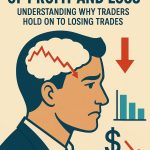Trading is not just about numbers and charts; it’s equally about the psychological makeup of the trader.
Understanding the psychological forces at play can be the difference between success and failure in the trading world.
In this comprehensive exploration, we’ll delve into why psychology is crucial in trading, touching upon the common emotional and cognitive biases that traders face and how mastering these can lead to better decision-making.
The Psychological Landscape of Trading
At its core, trading is a test of patience and nerves where emotional control becomes as critical as financial acumen.
Every trader, whether novice or experienced, must contend with a range of emotions from the thrill of a potential win to the fear of a sudden loss.
How well one manages these emotions can significantly impact their trading decisions and, ultimately, their profitability.
The role of psychology in trading extends beyond managing emotions.
It involves understanding one’s own psychological profile, including strengths and weaknesses in decision-making processes.
Are you prone to making impulsive decisions under stress? Do you become overly cautious after a loss?
Recognizing these traits and learning how to manage them can help in developing a more disciplined trading approach.
Why Focus on Trading Psychology?
Focusing on psychology is essential because it directly influences risk management and trading strategy implementation.
A trader who understands and controls their psychological biases is better equipped to stick to a trading plan and make rational decisions, even in the face of market volatility.
In the following sections, we will explore key psychological factors that influence trading behaviour, common psychological challenges traders face, and strategies to harness psychological insights for improved trading performance.
By integrating psychological awareness into your trading strategy, you can not only enhance your decision-making skills but also gain a competitive edge in the market.
Understanding Trading Psychology
The Fundamentals of Trading Psychology
Trading psychology refers to the emotional and mental state that helps or hinders a trader in making decisions.
While financial indicators and market strategies are tangible and often quantifiable, the psychological elements are subjective and can significantly influence trading outcomes.
Understanding these aspects is vital for every trader aiming to improve their market performance.
Cognitive Biases in Trading
One of the central themes in trading psychology is the impact of cognitive biases. These biases can distort thinking and decision-making processes, often leading traders away from rational, logical approaches.
Here are some common biases that affect traders:
- Confirmation Bias: This occurs when traders look for information that confirms their preconceptions and ignore contrary evidence. It can lead to overconfidence in certain trades or strategies without proper risk assessment.
- Loss Aversion: Typically, traders feel the pain of a loss more intensely than the pleasure of a similar gain. This bias can prevent traders from closing out losing positions, leading to greater losses.
- Herd Mentality: Many traders often follow the crowd without a thorough analysis of their actions. This behavior can inflate bubbles or deepen market corrections, creating risky conditions for follow-the-crowd traders.
Emotional Factors
Emotions play a significant role in trading decisions. The fear of missing out (FOMO), greed, fear, and hope can all skew rational trading decisions, pushing traders to deviate from planned strategies.
For instance, FOMO can cause traders to enter a trade too late, at a much higher risk, while greed can prevent them from taking profits in anticipation of even greater gains, often backfiring.
The Psychological Traits of Successful Traders
Successful traders often share certain psychological traits that enable them to perform well in volatile markets. These include:
- Discipline: The ability to stick to a trading plan and resist impulsive decisions.
- Confidence: Trusting their trading strategy and skills without crossing into overconfidence.
- Resilience: The capacity to endure losses without emotional upheaval, learning from mistakes instead of being discouraged by them.
- Objectivity: Maintaining detachment from individual trades to evaluate performance based on long-term results rather than short-term fluctuations.
Psychology and Risk Management
Effective risk management is closely tied to trading psychology. Traders must be able to assess risks accurately and manage their emotional responses to those risks.
Implementing stop-loss orders and setting realistic profit targets are part of this, but so is preparing mentally for the possibility of loss and having strategies in place to handle the emotional stress of trading.
Major Psychological Elements in Trading

1. Fear and Greed: The Dominant Drivers
Fear and greed are two primal emotions that significantly impact trading behaviour. Understanding and managing these emotions are crucial for trading success.
- Fear: This emotion can manifest in various ways, such as the fear of losing money, fear of missing out, or fear of failure. Fear can lead traders to sell their positions prematurely or avoid taking necessary risks. Strategies to manage fear include setting clear risk parameters, maintaining a well-balanced portfolio, and practising mindfulness to stay grounded in logical decision-making.
- Greed: Conversely, greed can drive traders to take on too much risk in the hope of higher returns. It often leads to ignoring set trading plans and can result in devastating losses. Combatting greed requires discipline to adhere to a trading strategy and knowing when to cash in profits based on realistic targets rather than speculative hopes.
2. Overconfidence and Control
Overconfidence often follows a series of successful trades, leading traders to believe they have more control over the markets than they actually do.
This illusion of control can be dangerous, as it encourages taking greater risks without proper analysis.
- Managing Overconfidence: Regular review of trading decisions and outcomes can help keep overconfidence in check. It’s also helpful to engage with a community of traders to gain diverse perspectives and stay grounded.
- Illusion of Control: Traders can overcome this by focusing on process-oriented goals instead of outcome-oriented ones. By valuing the quality of their decision-making process over the outcomes, traders can maintain a realistic approach to the markets.
3. Patience and Discipline
Patience and discipline are essential for long-term success in trading. They help traders to stick to their strategies and avoid impulsive decisions influenced by short-term market fluctuations.
- Building Patience: One way to build patience is through the use of trading simulations or paper trading, where traders can practice their strategy without financial risk. This helps in reinforcing the importance of waiting for the right trading conditions.
- Maintaining Discipline: Creating and adhering to a comprehensive trading plan is key. This plan should include not only entry and exit rules but also guidelines for emotional management, such as taking breaks after a losing streak.
4. Emotional Resilience
The ability to recover from losses without emotional damage is critical. Emotional resilience can be fostered by:
- Setting realistic expectations: Understanding that losses are part of trading and setting expectations accordingly can help mitigate emotional responses.
- Emotional accounting: Keeping a journal to track emotional states alongside trades can provide insights into how emotions affect trading decisions and help develop strategies to counteract negative emotional influences.
5. Psychological Traps and How to Avoid Them
Traders often fall into psychological traps that can derail their trading strategies. Recognizing these traps is the first step in avoiding them.
- Recency Bias: Giving undue importance to recent events over historical data can lead to skewed decision-making. To avoid this, traders should base their decisions on a wider range of data and longer-term performance trends.
- Anchoring: This occurs when traders rely too heavily on an initial piece of information (anchor) to make subsequent judgments. To combat anchoring, it’s important to continually re-evaluate the initial assumptions with new information and adjust strategies accordingly.
Psychological Challenges Traders Face

1. Emotional Decision-Making vs. Strategic Planning
Traders often struggle to separate their emotions from their trading strategies, which can lead to impulsive decisions and inconsistent results.
- Recognizing Emotional Triggers: The first step in overcoming emotional decision-making is recognizing the emotional triggers that lead to impulsive actions. Whether it’s the thrill of a potential gain or the panic of an unexpected market downturn, identifying these triggers can help traders begin to control them.
- Strategic Planning: Developing a detailed trading plan that includes predefined criteria for entering and exiting trades can help traders stick to a strategy even when emotions run high. This plan should also incorporate risk management techniques that align with the trader’s personal risk tolerance.
2. Dealing with Loss and the Psychology of Risk
Loss is an inevitable part of trading, but dealing with it effectively is what separates successful traders from the rest.
- Normalizing Loss: It’s important for traders to accept that losses are a normal part of trading. This mindset helps in maintaining a rational approach during downturns.
- Risk Management: Effective risk management strategies are essential. These might include setting stop-loss orders, diversifying investments, and deciding in advance how much of their total capital they are willing to risk on any single trade.
3. Stress Management and the Importance of Mental Health
Trading can be a high-stress activity, with rapid market fluctuations and high stakes involved.
- Techniques for Managing Stress: Regular physical exercise, meditation, and ensuring sufficient rest are practical methods for managing stress. Additionally, some traders find that setting strict trading hours and adhering to a work-life balance can prevent burnout.
- Mental Health Maintenance: Maintaining mental health is crucial. This may involve seeking professional help such as therapy or counseling, especially if trading stress begins to affect other areas of life.
4. Overcoming Analysis Paralysis
Analysis paralysis occurs when a trader overanalyzes or overthinks a situation, preventing them from making a decision and potentially causing them to miss profitable trades.
- Simplifying Analysis: Traders can overcome analysis paralysis by simplifying their analysis process. This could involve reducing the number of technical indicators they use or setting a time limit for making a decision.
- Confidence in Decision-Making: Building confidence through education and practice can help. More experienced traders often rely on their intuition, developed through years of trading, to make quicker decisions.
5. The Challenge of Consistency
Maintaining consistency in trading strategies and execution can be challenging, especially in volatile markets.
- Routine and Rules: Establishing a daily routine and strict trading rules can aid in developing consistency. This includes reviewing trades at the end of each day to ensure that all moves align with the strategic plan.
- Continual Learning and Adaptation: The market is always changing, and strategies may need to be adjusted. Regularly scheduled reviews of trading strategies and continuous learning can help traders adapt and improve their consistency.
Strategies to Enhance Trading Psychology

1. Developing a Trading Plan and Sticking to It
A solid trading plan acts as a blueprint for trading actions, underpinned by rules and guidelines that help prevent emotional decision-making and maintain discipline.
- Components of a Trading Plan: It should include the trader’s financial goals, risk tolerance levels, analysis methods, and specific criteria for entering and exiting trades. This clarity helps in minimizing uncertainty and emotional bias.
- Consistency: Regularly reviewing and adhering to the trading plan is crucial. Adjustments should be made based on objective evaluations of the plan’s performance, not emotional reactions to profits or losses.
2. Importance of Continuous Learning and Adaptability
The financial markets are dynamic, and successful traders must continually adapt their strategies to match changing conditions.
- Education: Keeping up-to-date with new trading techniques, economic factors, and market conditions is essential. This can involve reading financial news, participating in webinars, or taking advanced trading courses.
- Adaptability: The willingness to adapt strategies based on market changes can significantly impact a trader’s success. This includes being open to new information and willing to experiment with different trading methods.
3. Tools and Techniques for Maintaining Emotional Equilibrium
Maintaining emotional control is key to effective trading. Several tools and techniques can help manage emotional responses.
- Mindfulness and Meditation: These practices can enhance a trader’s ability to remain calm and focused, especially in high-pressure situations. Mindfulness helps in recognizing emotional states without being overwhelmed by them.
- Psychological Trading Tools: Tools such as trading journals and emotional metrics can help traders track their emotional states and identify patterns that may affect their trading decisions. This self-awareness is crucial for developing better trading habits.
- Support Networks: Engaging with a community of traders can provide support and valuable insights, reducing feelings of isolation and stress. Peer discussions can offer new perspectives and coping strategies.
4. The Role of Simulation and Backtesting
Before applying a strategy in live trading, it’s beneficial to test it through simulations or backtesting to ensure its viability without the emotional stress of actual trading.
- Simulation Tools: Many trading platforms offer simulation options that replicate real-time market conditions, allowing traders to practice their strategies and decision-making processes.
- Backtesting: This involves testing a trading strategy against historical market data to see how it would have performed. It helps in refining strategies and building confidence.
5. Setting Realistic Goals and Expectations
Realistic goals prevent the disillusionment that comes from unmet expectations, which can lead to frustration and risky trading behaviors.
- Goal Setting: Goals should be specific, measurable, attainable, relevant, and time-bound (SMART). This approach helps traders maintain focus and drive without becoming overwhelmed by unrealistic ambitions.
- Expectation Management: Understanding the market’s volatility and the commonality of losses can help set more realistic expectations, which in turn aids in maintaining a steady psychological state.
Real-World Applications of Trading Psychology

Real-world applications of trading psychology are vital for understanding how theoretical concepts translate into practical trading strategies.
By examining case studies and successful traders’ habits, we can glean valuable insights that reinforce the psychological principles discussed earlier.
Case Studies of Successful Traders
Many successful traders emphasize the psychological aspects of trading as much as the technical ones.
For instance, traders like George Soros and Jesse Livermore are known not only for their strategic acumen but also for their ability to manage emotions and maintain psychological resilience under pressure.
Analyzing their trading patterns reveals that risk management, discipline, and emotional control are consistent themes contributing to their success.
Psychological Tools Used by Top Traders
- Mental Conditioning: Top traders often use mental conditioning techniques, such as visualization and positive affirmation, to prepare for the trading day and maintain a positive outlook.
- Emotional Analytics Tools: Advanced traders utilize software that tracks their emotional states and alerts them when their decisions might be overly influenced by emotions like fear or greed.
- Peer Networks: Engaging in networks where traders share insights and support each other can also be a practical application of trading psychology, providing emotional support and helping to mitigate the sense of isolation that can come with trading.
Learning from Mistakes
A common trait among successful traders is their approach to mistakes.
Instead of dwelling on losses, they analyze these setbacks to understand what went wrong and how they can improve.
This mindset turns potential negative experiences into powerful learning opportunities, reinforcing the importance of a growth-oriented psychological approach in trading.
Conclusion
In this comprehensive guide, we’ve explored the integral role of psychology in trading, examining how emotions and psychological traits significantly influence trading decisions.
We’ve delved into the major psychological elements that affect traders, the challenges they face, and effective strategies to manage these challenges.
By developing a robust trading plan, maintaining emotional equilibrium, and continuously adapting to market changes, traders can enhance their psychological fortitude.
Embracing these strategies not only improves decision-making and performance but also cultivates a disciplined and resilient trading mindset.
Remember, in trading, mastering the market starts with mastering the mind.











